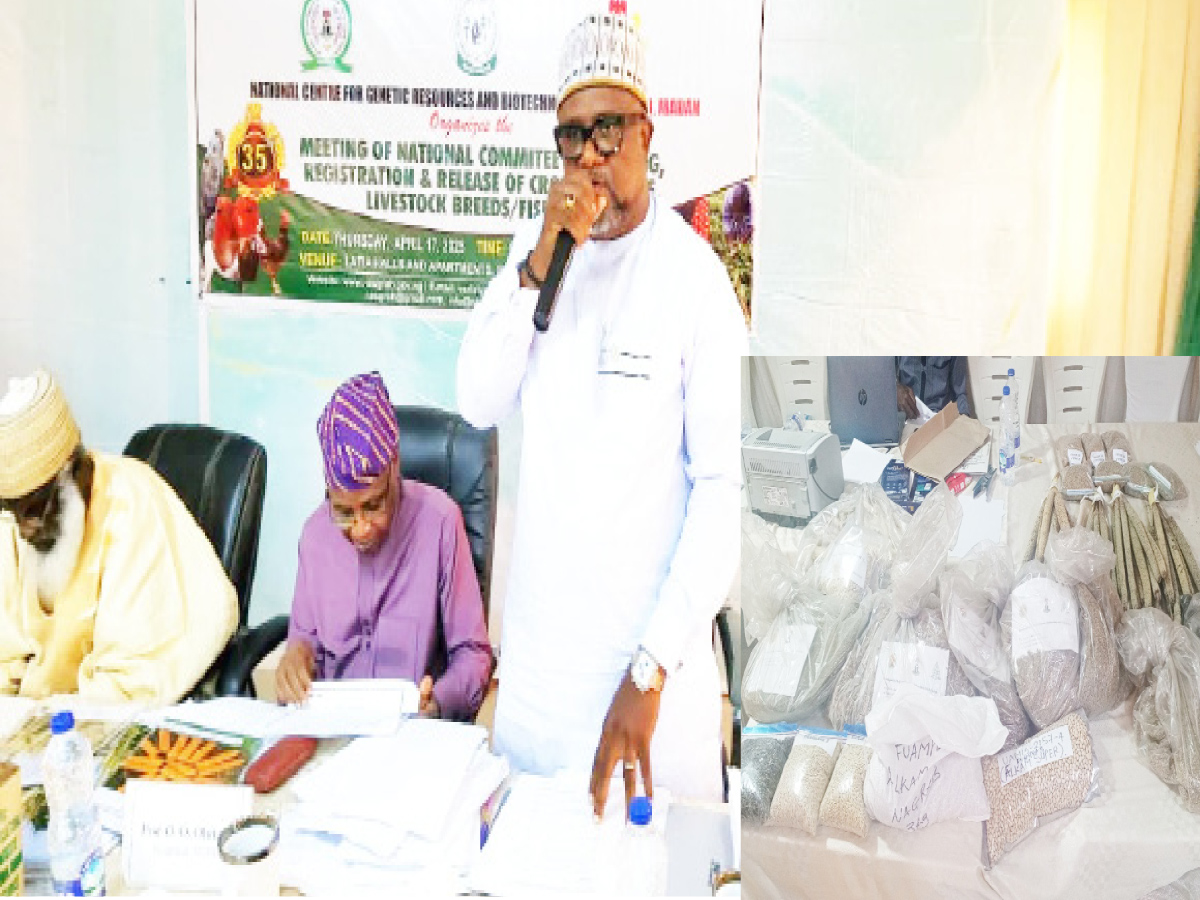•Farmers to have access to newly released crop varieties faster than usual —NACGRAB Director
The National Committee on Naming, Registration and Release of Crop Varieties, Livestock Breeds/Fisheries, has approved the registration and release of 29 new high-yield crop varieties for the use of Nigerian farmers towards increasing agricultural production.
The registration and release of the new crop varieties were announced during the 35th meeting of committee which was hosted by the National Centre for Genetic Resources and Biotechnology (NACGRAB), Ibadan and held at Lafia Halls and Apartments, Ibadan, the Oyo State capital.
The meeting was presided over by the Chairman of the committee, Professor Soji Olufajo and was well attended by committee members and all relevant stakeholders. Eight pasture varieties, comprising six grasses and two legumes were approved for retroactive registration.
Olufajo, announced the registration and release of the 29 new crop varieties based on recommendations from the committee’s technical sub-committee.
The technical sub-committee, led by Professor Shehu Ado, had earlier deliberated on the proposed varieties during its 35th meeting held on Tuesday at the same venue.
Following extensive consideration, the sub-committee recommended all varieties for release, which were subsequently approved by the NVRC.
Olufajo noted that the newly registered varieties were submitted by research institutes, universities, and private seed companies.
The crops include pepper, tomato, maize, rice, cowpea, millet, wheat, sesame, barley, and soybean.
Among the new releases were two pepper varieties—HORTIPEP1 and HORTIPEP2—developed by the National Horticultural Research Institute (NIHORT), Ibadan.
These were approved based on high yield potential, medium maturity, strong pungency, and aromatic qualities.
Two tomato varieties, also developed by NIHORT, were released due to their superior fruit quality, tolerance to fruit cracking, and adaptability to open-field rainfed cultivation.
Six rice varieties—ETG M401, ETG M601, SAMMAZ 77, 19C11934 (SC451), 16C34878 (SC563), and 18C2450 (SC618), were additionally released for their high yields, high zinc content, and good grain quality.
Other varieties approved include cowpea: UAM15-2157-4 and ALKAM Super, Barley: LACRISAMBarley4, LACRISAMBarley5, and LACRISAMBarley6 and Hybrid Rice: FARO 71, FARO 72, and ADVANTA 8200.
The basis for consideration for registration and release were high yields, early maturity, and disease resistance.
Representative of the farmers at the meeting, Mr Samuel Adeyinka, while speaking with journalists on the sideline of the meeting, called on the committee to work more closely with the Federal Ministry of Agriculture and Food Security to ensure farmers were informed about and had access to the newly released varieties.
He stressed that the committee’s efforts would only be meaningful if the improved varieties reach the farmers who need them.
Adeyinka also encouraged farmer associations to be on the lookout for the newly released crop varieties which he said will surely boost their productivity.
Speaking with journalists after the announcements, Registrar and Director, NACGRAB, Dr Anthony Okere, said: “The highpoint of today’s committee meeting is releasing new crop varieties from the research institutes which is as a result from their efforts over the years.
“Especially, the release of biofortified rice and this would not have been possible without the committed effort of Harvestplus. Another is knowing fully well that there is a big problem in the country which is ravaging our agricultural sector and of course the farmers/herders clashes and today we succesfully release some legumes and grasses for the sake of ranching.
“You know the federal government has been working hard to resuscitating ranching of our cattle in order to forestall the incessant clashes between farmers and herders.
“So, together with the Ministry of Livestock and Production, the minister was represented at this meeting by his Special Adviser, Professor Iyayi, who also worked hard to facilitate this effort to making sure that six materials that will be serving that sector is released, even though it is retroactive, it will go a long way in helping us to assuring those who will be going into that business and our farmers that there won’t be any form of clash forthwith.”
Commenting on how the newly released crop varieties will get to the farmers easily, Okere, noted: “While the Chairman was speaking during this meeting, at a point, he empasised that forthwith, if the samples of the materials that are to be released are not brought upon coming for the release, they will not be considered.
“This, has actually been one of the key factors we have been considering all this while because the adoption of materials has always been a problem, because after release we now fealised that it takes more years before farmers get those materials.
“But with this new style now, those materials that we released today, the seeds came meaning that we will have the portion we are supposed to have, the National Agricultural Seed Council (NASC) will have its portion and of course it is going to make it faster than usual.”
READ ALSO: Nigeria will soon witness food sufficiency, price reduction – NACGRAB








